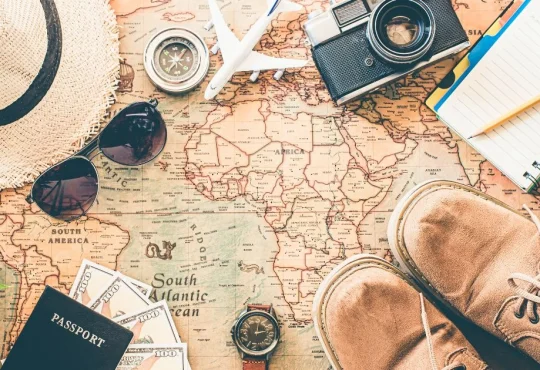Whether you’re a frequent flyer or an occasional traveler, you’ve likely mastered airport security, smart packing, and selecting your ideal seat. But have you ever considered what your cabin crew notices about you as you board? Flight attendants quickly assess passengers, noting nervous fliers, potential rule-breakers, and those needing extra assistance—all within a few seconds. Their observations, including details like your attire, ensure your safety and comfort.
Best Plane Boarding Tips: Top 13 Things FA Notice Immediately!
Your Apparel, Footwear, and Accessories
Apart from someone’s face, their outfit is one of the first things we notice about them. Have you ever caught someone glancing up and down at what you’re wearing in public, taking it all in within a split second? The same happens with cabin crew as you board your flight, although their reasons are a bit different. Flight attendants are scanning for any clothing or jewelry that might become a hazard, especially in an emergency—think items that are loose or hanging awkwardly. They also note passengers wearing uncomfortable items. High heel shoes, big hoop earrings, jumpsuits, or tight-fitting clothing are examples of things you might want to reconsider wearing on your flight.
Instead, prioritize comfort over style, especially for long journeys. This means having a sweater handy for when the cabin gets chilly, wearing stretchy pants that are easy to adjust or remove when using the bathroom, and choosing your most comfortable sneakers. When you dress for comfort and function, you can’t go wrong.
Your Luggage
Cabin crew are trained to scrutinize your luggage. They check if your luggage is tagged for cargo, if you’re wearing a fanny pack, the size of your bag, and if you appear to be struggling with your luggage. They’re also on the lookout for oversized bags that could cause problems in the aisles or overhead bins, as this can slow down the boarding process for everyone.
Or you’re trying to bypass airline rules by bringing too many bags on board. While you might slip past check-in desks and boarding gate staff, it’s nearly impossible to fool flight attendants. It’s just not worth the hassle. Instead, do yourself a favor and thoroughly check all the requirements for your specific airline before you fly, including personal bag allowances and size dimensions. Ensure that you weigh your bags before going to the airport.
Your Well-Being
When meeting someone new, we often take note of their physical appearance to gauge their well-being—whether they look refreshed and healthy or appear tired and unwell. For flight attendants, this observation is crucial during boarding, as they must assess passengers for signs of illness that could potentially affect the confined environment they’ll share with hundreds of others. Recognizing symptoms early allows crew members to make adjustments for passenger comfort, such as seating arrangements closer to facilities or in more accessible spots.
However, if a passenger’s condition raises concerns about their ability to fly safely, flight attendants may need to intervene. In serious cases, this could mean advising the passenger to deplane before departure. Conversely, passengers who appear fit and healthy are seen as assets, especially in emergencies where their strength and capability could be valuable. Flight attendants actively identify these individuals, referred to as non-disabled passengers (ABPs), noting their positions to assist crew and fellow travelers if needed.
Your Pregnancy Progress
If you’re pregnant, flight attendants are trained to assess your stage of pregnancy primarily for safety reasons. You are generally flying before the 36-week mark, which is considered safe unless there are complications for you or the baby. Airlines may request a doctor’s note if you’re flying later in your pregnancy to ensure it’s medically advisable. Booking a flight within four weeks of your due date is generally discouraged to avoid the risk of going into labor mid-flight, which can be challenging for both you and the airline crew.
Beyond safety concerns, flight attendants want to ensure your comfort while traveling pregnant. They may allocate you a seat with extra legroom for stretching, an aisle seat for easier mobility, or a location close to the bathrooms for convenience. Additionally, they may check on you more frequently during the flight to inquire about your needs regarding food, beverages, and overall comfort.
Bringing Your Food
Plane food often gets a bad rap for its taste and healthiness, a sentiment echoed by flight attendant Shreyas Parikh on Quora. He explained that the meals served onboard are typically prepared hours or even days before departure in aircraft catering, which can affect their freshness and flavor. Additionally, the altered cabin pressure at high altitudes can dull our senses of taste and smell, prompting airlines to enhance flavors with extra spices, salts, and fats to compensate.
Given these considerations, many flight attendants opt to bring their meals onboard rather than rely on plane food. This practice reflects a proactive approach to health and comfort, as passengers who bring their food demonstrate foresight and a commitment to their well-being while traveling. This choice is quietly appreciated by cabin crews who understand the limitations of onboard catering and value passengers’ efforts to ensure a satisfying and nourishing flight experience.
Your Friendliness
Are you someone who eagerly crowds the gate or patiently waits your turn to board? Flight attendants are already assessing passengers at the boarding gate, observing their demeanor and predicting how cooperative they might be during the flight. There’s even a term among crew members for those who cluster around the gate before their group is called: “gate lice.”
This scrutiny is meant to be neutral but rather practical. Flight attendants want to ensure a smooth journey for everyone onboard and appreciate passengers who demonstrate friendliness, attentiveness to instructions—especially during pre-departure announcements—and respect towards fellow travelers. Whether you aim to foster a pleasant atmosphere, ensure a hassle-free flight, or even increase your chances of receiving perks like upgrades, making a positive impression with the cabin crew can go a long way.
If You’re Anxious About Flying
Flight attendants are adept at recognizing nervous passengers. If you find yourself feeling anxious about flying, it’s perfectly okay to inform the cabin crew—they may have already noticed your apprehension. They look for various signs, from minor indicators like fidgeting or holding onto personal items tightly to more pronounced symptoms such as nausea or signs of an impending panic attack.
Flight attendants are committed to ensuring your comfort and safety during the flight. They can often accommodate nervous flyers by adjusting seating arrangements, such as offering seats in areas of the plane known for stability during turbulence, like over the wings or near the front. Additionally, suppose you’re traveling alone and feel anxious about specific phases of the flight, such as take-off or landing. In that case, they can provide reassurance and support by maintaining eye contact or offering calming words.
If You’re Under the Influence
It’s important to refrain from overindulging in alcohol or drugs before flying, as flight attendants are quick to detect signs of intoxication, such as slurred speech, disruptive behavior, or aggression. These behaviors are flagged early on, often during the boarding process, when crew members greet passengers to assess their demeanor for any indications of potential disruption or antisocial conduct. Whether it’s alcohol or drug intoxication, being visibly impaired can lead to removal from the flight even before departure.
According to Nuralia Mazlan, a flight attendant with Air Asia, identifying and managing intoxicated or drug-affected passengers is a priority. She highlights instances where such individuals have caused disturbances onboard, emphasizing the potential for trouble in these situations. For instance, she recalls an incident involving a passenger who stripped naked during a flight from Kuala Lumpur to Dhaka, underscoring the disruptive impact such behavior can have on the safety and comfort of fellow travelers and crew.
If You Need Special Assistance
This is crucial. While you may have informed airline staff of any assistance needed during booking, some disabilities may not be immediately apparent. Flight attendants are vigilant during boarding to identify passengers who might benefit from additional support during the journey. This includes individuals with less visible disabilities, families with young children or infants, and elderly travelers. In case of emergencies, flight attendants need to know who may require specialized assistance.
Once identified, flight attendants can ensure your flight goes smoothly by arranging accommodations such as extra legroom, a seat in a stable part of the plane to minimize turbulence, a vacant row if available for comfort or illness, or seating closer to the bathrooms for convenience. Their role is to assist you, so feel free to request reasonable accommodations that will enhance your travel experience.
If You’re Carrying Prohibited Items
They are attempting to deceive airline staff by sneaking alcohol on board in disguised containers or trying to smoke, whether traditional cigarettes or e-cigarettes, which is strongly discouraged. Flight attendants are trained to monitor passenger behavior closely, and attempting such actions can lead to serious consequences, including fines or legal penalties. Besides, many flights offer a selection of complimentary alcoholic beverages, making the risk unnecessary.
Moreover, attempting to bring unauthorized animals on board, even if they are small pets hidden in bags, is against airline regulations. International travel with pets requires adherence to strict guidelines, including professional vetting, proper FAA-approved carriers, pre-registration with the airline, and payment of associated fees. It’s essential to comply with these rules to ensure the safety and comfort of all passengers and pets during the journey.
Your Boarding Companions
Upon boarding, flight attendants keenly observe your group composition, whether you’re accompanied by small children, a partner, business colleagues, an elderly relative, or traveling solo. This awareness allows them to be strategically positioned to assist as needed, whether it’s aiding parents with restless toddlers or offering reassurance to nervous solo travelers.
Knowing the dynamics of your group also aids flight attendants in organizing seating arrangements for emergency preparedness and passenger comfort. Their priority is ensuring the happiness and safety of all passengers throughout the flight. When feasible, cabin crew may facilitate seating arrangements to ensure families and friends can sit together, enhancing the overall travel experience.
If You’re a Crew Member
Flight attendants are trained to identify if you’re an airline employee, which can be advantageous in emergencies. Apart from shared experiences, crew members recognize that off-duty airline personnel can provide valuable assistance if needed. Those who travel for leisure but are trained in safety protocols are particularly valuable in such scenarios.
While aviation incidents like the 1989 United Flight 232 crash in Sioux City, Iowa, are rare and tragic, they underscore the importance of trained individuals on board. In that instance, United Airlines captain Dennis Fitch, traveling as a passenger, played a crucial role by assisting the crew during the emergency landing, potentially reducing the severity of the disaster. Such cases highlight how additional trained personnel can significantly aid in critical situations during flights.
If You’re Seated in an Emergency Exit Row
Sitting in those coveted emergency exit rows means more legroom, but it also carries significant responsibilities. Flight attendants meticulously check boarding passes to identify passengers assigned to these seats and assess their readiness to fulfill emergency duties.
Passengers seated in emergency exit rows must be physically capable of operating the exits, understand emergency procedures, and effectively communicate instructions to others. Consequently, calm and composed individuals are typically chosen for these roles. If you’re uneasy about the responsibility and find yourself in an emergency row, it’s advisable to inform the cabin crew promptly. They are likely already aware and can assist in rearranging seating if necessary.
Conclusion:
Understanding what flight attendants notice about you during boarding can significantly impact your flying experience. From your attire to your physical condition and demeanor, flight attendants swiftly assess these details for safety and comfort. Their observations ensure appropriate seating arrangements and assistance for passengers, preparing everyone for potential emergencies. By being mindful of these factors, passengers can contribute to a smoother journey and help create a cooperative atmosphere onboard.





